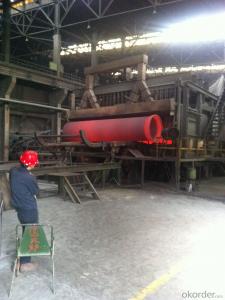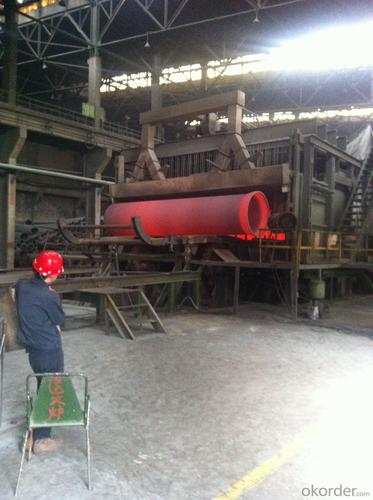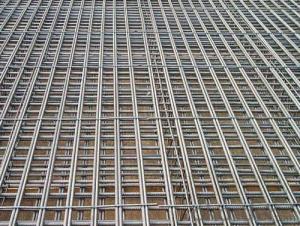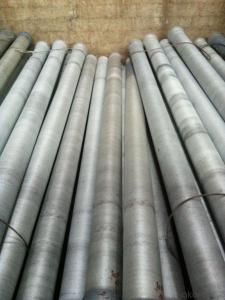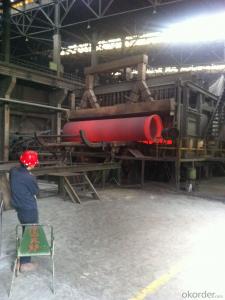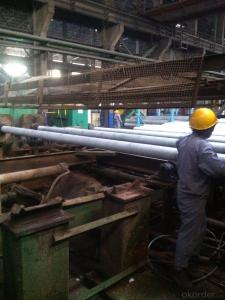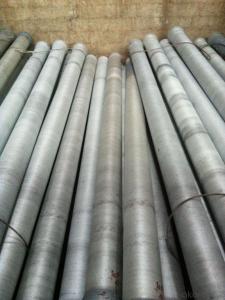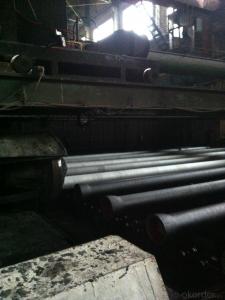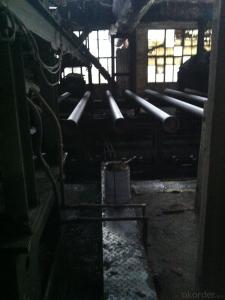DUCTILE IRON PIPE AND PIPE FITTINGS K9 CLASS DN600
- Loading Port:
- Tianjin
- Payment Terms:
- TT OR LC
- Min Order Qty:
- 21 pc
- Supply Capability:
- 3000 pc/month
OKorder Service Pledge
OKorder Financial Service
You Might Also Like
Material : Ductile Cast Iron
Size Range : DN 80mm to DN 2000mm
Unit Effective Length : 6m or 5.7m
Manufacture Standard: ISO 2531:1998/ EN 545:2006/EN 598:2007
Annual capacity : 200,000 tons
Coating Exterior: Zinc 130g/m2 according to ISO 8179-1 and bitumen coating 70 microns.
Cement Interior: Portland Cement/ High Alumina Cement/ Sulphate Resisting Cement Lining according to ISO 4179
Special requirements on external coating and internal lining can be applied
We also provide accessories such as SBR/EPDM rubber gaskets, lubricant paste, pipe caps, PE sleeves, etc.
Additional Parts:
Each pipe is strictly inspected according to related standard to ensure permanently high performance.
Easy Installation at site and service free for life
Long Service Lifespan
Quotation will arrive you within 24hours once we get your inquiry.
We guarantee offering you a competitive price.
A copy of original inspection reports of pipes will be offered after shipment.
Photos of loading process will be sent to the customer after shipment effect.
We will follow-up the delivery progress after shipment effect and update to the customer on weekly basis.
- Q: What are the differences between ductile cast iron pipes and centrifugal ductile iron pipes?
- Small, thin pipe fittings are usually rolled or continuously cast, and large, thick pipes are usually centrifugally cast. Compared to sand casting, the tissue is compact and homogeneous.
- Q: Are ductile iron pipes suitable for industrial water systems?
- Yes, ductile iron pipes are suitable for industrial water systems. They possess excellent strength, durability, and corrosion resistance, making them ideal for transporting water in industrial settings. Additionally, their ductility allows them to withstand high pressure and accommodate for ground movement, ensuring long-term reliability in industrial water systems.
- Q: Are ductile iron pipes resistant to external loads?
- Yes, ductile iron pipes are highly resistant to external loads. Their inherent strength and flexibility make them capable of withstanding heavy loads and stresses from surrounding soil and traffic.
- Q: Are ductile iron pipes suitable for trenchless installation methods?
- Trenchless installation methods can indeed utilize ductile iron pipes effectively. Renowned for their strength, durability, and flexibility, ductile iron pipes prove to be an excellent choice for techniques like horizontal directional drilling (HDD) and pipe bursting. When employing HDD, a small pilot hole is drilled underground, and the ductile iron pipe is subsequently pulled through this hole, eliminating the need for extensive trenching. The robustness of ductile iron pipes allows them to endure the pulling forces exerted during this process while being effortlessly guided along the underground path. Pipe bursting, on the other hand, is another trenchless method that involves breaking apart an existing pipe while simultaneously pulling a new ductile iron pipe into place. Due to their strength and flexibility, ductile iron pipes can withstand the force required to burst the current pipe, resulting in minimal disruption to the surrounding area. Both these trenchless installation methods offer various advantages when ductile iron pipes are used. These pipes possess a high resistance to corrosion and can endure high-pressure applications, making them suitable for a broad range of underground environments. Moreover, their long service life reduces the need for frequent replacement and maintenance. Ultimately, ductile iron pipes emerge as a dependable and appropriate option for trenchless installation methods, presenting efficient and cost-effective solutions for underground pipe installations.
- Q: Are ductile iron pipes suitable for use in mining applications?
- Ductile iron pipes are well-suited for mining applications due to their unique properties. Also known as nodular cast iron, ductile iron is a type of iron that has been modified with magnesium or cerium to enhance its microstructure, resulting in increased strength and flexibility compared to traditional cast iron. These enhancements make ductile iron pipes highly resistant to impact, corrosion, and abrasion, which are common challenges in mining environments. In mining applications, ductile iron pipes find multiple uses, including water supply, slurry transportation, and ventilation systems. Their exceptional durability and resistance to wear and tear make them ideal for handling abrasive materials, chemicals, and high-pressure fluids typically encountered in mining operations. Moreover, the ability of ductile iron pipes to withstand heavy loads and external pressures makes them suitable for underground mining, where they may need to support the weight of overlying rock layers. With their high tensile strength and flexibility, ductile iron pipes help prevent pipe failure and reduce the risk of leaks or breaks, ensuring the safety and efficiency of mining operations. Furthermore, ductile iron pipes are relatively simple to install, maintain, and repair. They can be welded or joined using mechanical couplings, allowing for quick and efficient installation at mining sites. Their corrosion resistance also minimizes the need for frequent maintenance and replacement, resulting in cost savings for mining companies. Overall, the superior mechanical properties and durability of ductile iron pipes make them a reliable and practical choice for mining applications.
- Q: What are the different types of restrained joints for ductile iron pipe?
- There are several different types of restrained joints for ductile iron pipe. These joints are designed to prevent pipe separation or movement due to internal pressure, external forces, or ground movement. Some of the commonly used restrained joints for ductile iron pipe include: 1. Mechanical Restrained Joint: This type of joint uses mechanical devices such as bolts, nuts, and gaskets to hold the pipe in place. The joint is typically made up of a gland, a gland follower, and a restraint ring. The gland and gland follower compress the gasket against the pipe, while the restraint ring provides additional support and resistance against movement. 2. Push-on Restrained Joint: This joint utilizes a rubber gasket that is compressed when the two pipe ends are pushed together. The gasket provides a tight seal and also acts as a restraint against movement. Some push-on restrained joints also include additional mechanical devices to enhance the restraint capability. 3. Restrained Flange Joint: This type of joint combines the features of a flanged joint and a restrained joint. It consists of a flanged pipe end that is bolted to a flange on another pipe or fitting. The bolts and nuts provide the mechanical restraint, while the flange connection ensures a secure and leak-free joint. 4. Restrained Coupling Joint: This joint is a variation of the mechanical restrained joint. It utilizes a coupling that is bolted or clamped around the pipe ends, providing the necessary restraint. The coupling may also have a gasket to ensure a tight seal. 5. Restrained Socket Joint: This joint is similar to the push-on restrained joint, but it includes additional mechanical devices to enhance the restraint capability. The socket end of the pipe is typically designed to receive a pipe spigot, which is then secured using bolts, clamps, or other mechanical devices. These different types of restrained joints for ductile iron pipe offer varying levels of restraint and are selected based on the specific requirements of the application. They ensure the integrity and stability of the pipeline system, reducing the risk of leaks, pipe separation, or movement.
- Q: Can ductile iron pipes be used in areas with high levels of industrial effluents?
- Yes, ductile iron pipes can be used in areas with high levels of industrial effluents. Ductile iron is a type of cast iron that has enhanced flexibility and strength, making it highly resistant to corrosion and abrasion. This makes it suitable for handling various types of industrial effluents, including those with high levels of chemicals, acids, or other corrosive substances. Ductile iron pipes have a protective lining, such as cement mortar or polyethylene, which further enhances their resistance to chemical attack. These linings prevent the effluents from coming into direct contact with the iron material, ensuring the longevity and integrity of the pipes. Moreover, ductile iron pipes have been used extensively in industrial applications where corrosive environments are present. They have proven to be durable and reliable, with a long service life, even in challenging conditions. Proper maintenance and regular inspections are essential to ensure the continued performance of ductile iron pipes in areas with high levels of industrial effluents. It is crucial to consider the specific characteristics of the effluents and consult with experts or manufacturers to determine the most suitable pipe materials and linings for the particular industrial environment.
- Q: What are the different lining materials available for ductile iron pipe?
- Some of the different lining materials available for ductile iron pipe include cement mortar lining, polyurethane lining, polyethylene lining, and epoxy lining. These linings help to protect the pipe from corrosion and extend its lifespan.
- Q: Can ductile iron pipe be used for marine applications?
- Yes, ductile iron pipe can be used for marine applications. Ductile iron is a type of cast iron that possesses high strength, durability, and resistance to corrosion. These properties make it suitable for various marine environments, including saltwater applications. Ductile iron pipes are commonly used for marine applications such as seawater intake and outfall systems, offshore oil and gas platforms, submarine pipelines, and marine dredging projects. The corrosion-resistant nature of ductile iron helps protect against the harsh conditions found in marine environments, such as corrosive saltwater, tidal currents, and marine organisms. Additionally, ductile iron pipes are known for their excellent mechanical properties, including high tensile strength and impact resistance, which further enhance their suitability for marine applications. Overall, ductile iron pipe is a reliable and cost-effective choice for various marine applications.
- Q: Can ductile iron pipes be used for stormwater drainage systems?
- Yes, ductile iron pipes can be used for stormwater drainage systems. Ductile iron pipes are known for their strength, durability, and corrosion resistance, making them suitable for various applications, including stormwater drainage. They can handle high volumes of water flow and withstand heavy traffic loads, making them a reliable choice for stormwater management. Additionally, ductile iron pipes have excellent joint performance, ensuring a watertight and secure connection, which is crucial for preventing leaks and maintaining the integrity of the stormwater drainage system. Overall, ductile iron pipes are a viable option for stormwater drainage systems due to their robustness, longevity, and ability to withstand the harsh conditions often associated with stormwater management.
Send your message to us
DUCTILE IRON PIPE AND PIPE FITTINGS K9 CLASS DN600
- Loading Port:
- Tianjin
- Payment Terms:
- TT OR LC
- Min Order Qty:
- 21 pc
- Supply Capability:
- 3000 pc/month
OKorder Service Pledge
OKorder Financial Service
Similar products
Hot products
Hot Searches
Related keywords
